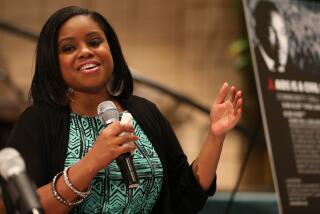TV Stars Bringing HIV Facts to Teens : Television: But the syndicated show airing on KABC Channel 7 on Aug. 29 is having a difficult time finding advertisers because of the nature of the program.
- Share via
A two-inch cockroach scurries along the stairs and a teen-ager in a glassy-eyed daze stumbles toward the door, muttering that the cameras inside this shelter for homeless youth in Hollywood leave him no room to breathe.
Inside, the heat is stifling. Actor Chad Lowe--who plays an HIV-positive teen-ager on the ABC series “Life Goes On” and who is participating in a syndicated special on AIDS aimed at teens--is rehearsing, stumbling over his lines as a packed house of teen-agers looks on.
The special, “Understanding HIV: Does Teen America Know the Facts?,” will air on KABC-TV Channel 7 in Los Angeles on Aug. 29 and features young actors from some of television’s most popular teen programs, including Ian Ziering and Gabrielle Carteris of Fox’s “Beverly Hills, 90210” and Tempestt Bledsoe from NBC’s “The Cosby Show.”
It will be shown on 170 stations affiliated with all four broadcast networks as well as independents--preempting network shows to air in prime time in many cities.
“It’s important, because so many people are dying right now,” said Bryan McCane, a homeless 18-year-old who spends his days at the L.A. Youth Network, where Lowe was taping his portion of the special. “And through TV you can get the point across easier.”
McCane, who sports a pork-pie hat, a wide tie and, on his arm, a tattoo of a rose, watched the taping while slung over a chair behind Lowe.
The actor, who has volunteered at this shelter for two years and leads a discussion group here, insisted that the taping be held at L.A. Youth Network, because teens who are part of the culture of the streets are particularly at risk for AIDS.
Lowe said that he has been active in AIDS work since his manager died of complications of the disease 2 1/2 years ago.
“The night he died, when I found out, I was overcome with so much grief, so much anger, so much pain,” Lowe said. “I prayed for something I could do to make a difference.”
The show will include music and fast-paced editing, and will be based around the idea that teens will listen best to other young people, said the show’s director, Richard Saiz.
Most kids know about AIDS, Saiz theorized, but don’t practice safe sex or abstinence because they don’t think HIV will infect them personally. And the lives of many teens and young adults, he said, revolve around sex.
For that reason, he said, the show includes interviews with four HIV-positive teen-agers, who urge teen viewers to remain safe. It also features questions from teens around the country, who were interviewed by local stations participating in the program.
“Whether it’s driving under the influence or having sex, it’s all part of being a teen-ager,” Saiz said. “What’s important is not just getting the message out, but changing (teens’) lifestyle.”
The producers of “Understanding HIV” say that it is unusual for a syndicated project, in part because it involves network players and in part because syndicated shows rarely tackle as serious a subject as AIDS prevention.
“We are taking a show that looks like, smells like, feels like a network special and doing it in syndication,” said Bob Horowitz, vice president and general manager of the production company GGP, which is making and distributing the special.
Syndicators tend to stay away from issue programs, Horowitz said, because they are believed to be harder to sell. “We don’t have an FCC license, so we’re not responsible via the license to provide community service programs,” he said.
But as was the case with “In a New Light,” a prime-time AIDS special recently produced by ABC, advertisers are staying away from the show, which is being billed as a benefit for AIDS organizations.
As of Friday, GGP had not sold any advertising time for the special, but was negotiating with the pharmaceutical company SmithKlein Beecham, Bristol-Myers Co.--which makes consumer health and beauty products--and Warner-Lambert consumer goods and packaging company, Horowitz said. Food company General Mills had expressed interest, but had not yet made a formal offer.
Some companies that have turned down the special have said that they do not want to be perceived as supporting promiscuity or homosexuality, Horowitz said.
“We have made corporate pitches where (companies) have said, ‘Yes, we’re involved in AIDS fund-raising and we play an active role, but we really do not advertise in this area because we’re concerned about the message,’ ” Horowitz said.
“To me, that doesn’t make sense,” he said. “This issue is something that is all around us, and it is not going to go away. It is not simply a gay disease. It is a virus. It is a disease.”
Horowitz said he gives the program a 50-50 chance of breaking even. But, he said, he is heartened by the number of stations carrying “Understanding HIV”--it will be shown in 80% of the United States, according to company figures--and he hopes that will encourage advertisers to sign on.
But even if it doesn’t do well, Horowitz said, GGP will probably try this type of show again.
“I think (‘Understanding HIV’) will be down at the bottom 10 to 20% of the shows we do in terms of profit,” Horowitz said. “But we’re committed to the cause, and we see it as being able to provide a service for stations.”
The company is also planning four specials for next year on health issues, Horowitz said, including one on women’s health and one on fitness.
More to Read
The complete guide to home viewing
Get Screen Gab for everything about the TV shows and streaming movies everyone’s talking about.
You may occasionally receive promotional content from the Los Angeles Times.






